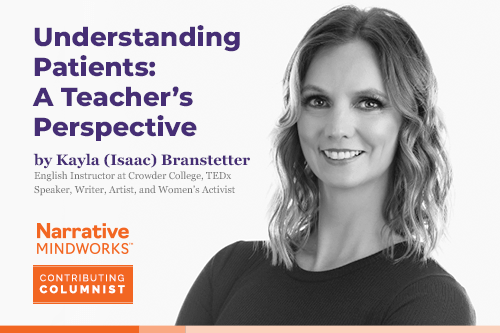By Kayla (Isaac) Branstetter – English Instructor at Crowder College, TEDx Speaker, Writer, Artist, and Women’s Activist.
Kayla discusses the critical importance of empathy in healthcare, drawing from personal experiences to illustrate how understanding patients' perspectives can improve care and human connection.
Introduction
In the realm of healthcare, empathy and understanding are vital. As premed students embark on their journeys to becoming healthcare professionals, they must learn to view their future patients through a lens of compassion and insight. This perspective is not merely an academic exercise; it is essential for fostering genuine connections and providing effective care. Here, I share my own experiences as a patient to illustrate the point: Understanding your patients is not just about diagnosing their ailments; it’s about recognizing their humanity. In doing so, you will not only become a better healthcare provider but also a compassionate ally in their journey toward health and healing.
The Classroom Lesson
The fall 2024 semester began, and several fresh-out-of-high-school students sat in my college classroom annoyed that they must enroll in an English Composition course to complete one of their degree requirements. A premed major, coupled with two pre-nursing students, verbalized their opinions, “I don’t see how this course will help my career.”
What happened next became part of my messaging as an English Instructor who possesses a passion in narrative medicine and writing. I introduced the rhetorical mode, narrative. I decided to begin with this style to gain a better understanding of my students’ backgrounds while gauging their writing skills. In essence, I granted them an opportunity to craft their stories. I asked the question, “How do I know you’re telling me the truth?” Every student I passed during my stroll through the aisles adopted that same I don’t know look, until one student answered, “You don’t.”
“You must write from your vantage point, and your vantage point only. You can only write what you know.”
Like before, my students ogled at me with confusion painted on their faces like a Jackson Pollock painting on display at the MET. I demonstrated a scenario, “Let’s say, there is a class occurring next door. Can someone tell me who is next door? What is being said?” A student spoke up, “No, because we aren’t there.”
Understanding the Patient’s Perspective
When I gave birth to my younger daughter, my ob-gyn left to catch a flight to Haiti to check on her clinic, leaving a different doctor to make the rounds. A male doctor entered my room to check on my status, and unlike my first birth, this delivery was easy and drama free, but not without injury. My doctor gave me two stitches, and as the day wore on, I began to feel the pangs of giving birth. I used my voice, coupled with my experience from my first pregnancy, to inquire about a prescription for Naproxen. The male doctor stared at his charts and blurted out, “You’re fine.”
At that moment, I didn’t feel like a human. I was a number. The doctor entered my postnatal room, asked the generic questions, and left. The entire interaction lasted less than five minutes, and he diminished my pain.
The Broader Issue of Women's Healthcare
For most of us, we view medicine as the art of solving our body’s mysteries, aches, and pains. We expect medicine, as a science, to uphold the principles of evidence and impartiality. But when we are denied fair and ethical treatment, our trust in the medical field tapers.
I am not a rare case of women feeling unheard. Two years ago, a student admitted she didn’t feel like her doctor listened to her about the menstrual pain she endured each month. The student belonged to a marginalized group, and this country possesses a history of doctors failing to acknowledge the existence of pain among Black women.
Modern medicine has evolved over the centuries as a profession, an institution, and a discipline, but the healthcare system continues to fail women. It’s not enough for medicine to address the gender biases contributing to the lack of care and empathy among women. Medicine and society must see our bodies from our vantage points. Our narratives about our bodies allow for the opportunity to solve many medical mysteries. The answers live in our bodies, and by permitting our vantage points to become more visible, we can push women’s healthcare forward.
Works Cited: Cleghorn, Elinor. Unwell Women: Misdiagnosis and Myth in a Man-Made World. Dutton, 2021.

